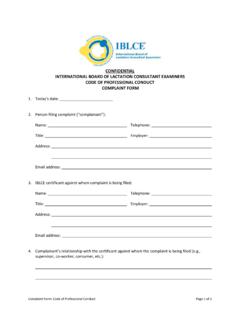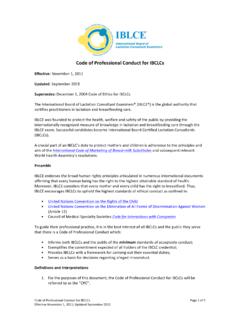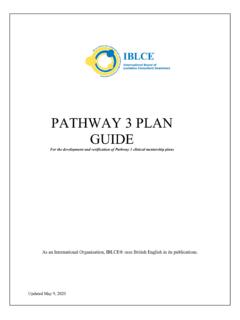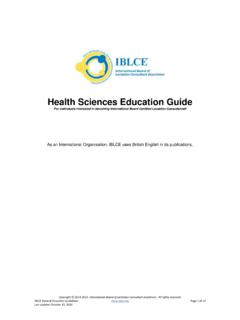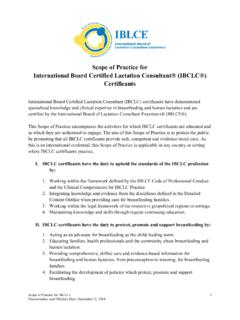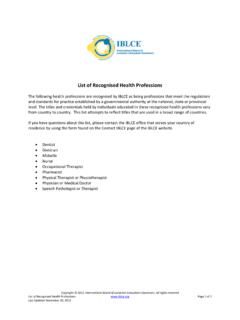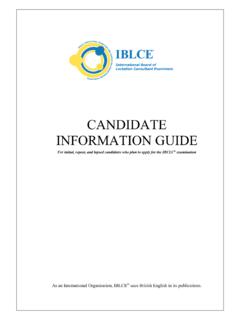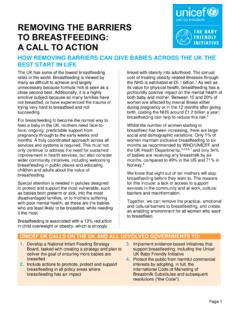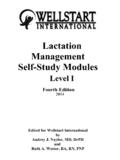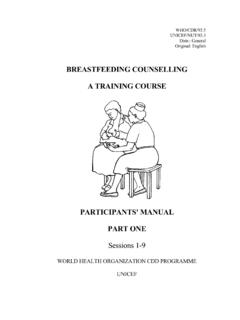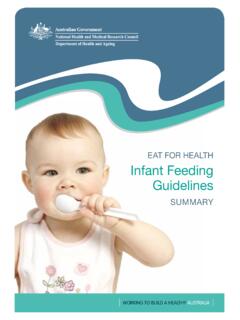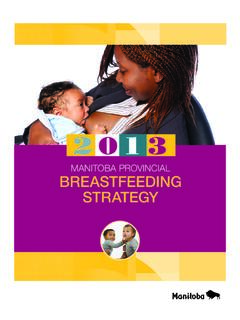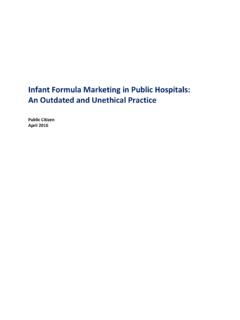Transcription of Clinical Competencies for the Practice of International ...
1 1 Clinical Competencies for the Practice of IBCLCs Dissemination and Effective Date: December 12, 2018 Clinical Competencies for the Practice of International Board Certified Lactation Consultants (IBCLCs ) International Board Certified Lactation Consultants (IBCLCs) demonstrate specialised knowledge and Clinical expertise in breastfeeding and human lactation and are certified by the International Board of Lactation Consultant Examiners (IBLCE ). The Clinical Competencies encompass the responsibilities/activities that are part of the IBCLC s Practice . The aim of these Clinical Competencies is to inform the public of the field in which IBCLCs can provide safe, competent and evidence-based care. The Clinical Competencies are applicable in any country or setting where IBCLCs Practice . It is understood that the IBCLC will Practice within the boundaries of their training, expertise, culture and setting. I. The IBCLC has the duty to uphold the standards of the profession and will: 1.
2 Conduct themselves in a professional manner, practicing within the framework defined by the code of Professional Conduct for IBCLCs, the Scope of Practice for the IBCLC Certificants, and the Clinical Competencies for the Practice of IBCLCs. 2. Critique, evaluate and incorporate research findings into Practice . 3. Obtain continuing education to enhance knowledge and skills to maintain IBCLC certification. 4. Practice within the laws and regulations in their country, jurisdiction and workplace. II. The IBCLC has the duty to protect, promote and support breastfeeding and will: 1. Provide evidence-based education about breastfeeding and human lactation to families, health professionals, educators and the community. This can be through various means including counselling, teaching, client information fact sheets, curriculum development, and multimedia campaigns. 2. Participate in the development of policies at local, regional, national and global levels which protect, promote and support breastfeeding or breastmilk/human milk for feeding children in all situations including emergencies.
3 3. Advocate for breastfeeding in all settings and promote breastfeeding as the 2 Clinical Competencies for the Practice of IBCLCs Dissemination and Effective Date: December 12, 2018 child-feeding norm. 4. Support practices which promote breastfeeding and discourage practices which interfere with breastfeeding by: a. Promoting the principles of the Baby-Friendly Hospital Initiative, the International code of marketing of Breast-milk Substitutes and subsequent resolutions, and the World Health Organization Global Strategy for Infant and Young Child Feeding. b. Carefully choosing a method of feeding when supplementation is necessary and using strategies to maintain breastfeeding to meet the client s goal. III. The IBCLC has the duty to provide competent services for clients and will perform a comprehensive maternal, child and feeding assessment related to lactation, such as: History Taking and Assessment Skills 1.
4 Obtain the client s permission to provide care on breastfeeding. 2. Ascertain the client s goals for breastfeeding/child-feeding. 3. Utilise appropriate counselling skills and techniques. 4. Respect a client s individuality, including but not limited to, sect, ability/disability, gender identity, sexual orientation, sex, ethnicity, race, national origin, political persuasion, marital status, geographic location, religion or culture. 5. Obtain a lactation history. 6. Identify events that occurred, before and during the pregnancy, labour and birth process that may adversely affect breastfeeding and human lactation. 7. Identify risks to lactation associated with pregnancy achieved with Assisted Reproductive Technology (ART). 8. Assess the breasts to determine if changes are consistent with adequate function/lactation. 9. Assess the impact of physical, mental and psychological states of the breastfeeding parent on breastfeeding.
5 10. Obtain child s health history and assess the impact of the child s medical condition on breastfeeding. 11. Assess social support and possible challenges. Skills to Assist Breastfeeding Dyad 1. Provide evidence-based information to assist the client to make decisions regarding infant feeding. 3 Clinical Competencies for the Practice of IBCLCs Dissemination and Effective Date: December 12, 2018 2. Promote skin-to-skin contact. 3. Assess oral anatomy, neurological responses and reflexes of the infant. 4. Assess infant behaviour and development as it relates to breastfeeding. 5. Provide education about child feeding behaviours; signs of readiness to feed, and expected feeding patterns. 6. Ensure the breastfeeding parent and infant are in comfortable positions for breastfeeding and assist as appropriate. 7. Identify effective latch/attachment. 8. Assess for effective milk transfer. 9. Assess milk intake of the infant.
6 10. Assess the child s stooling and voiding. 11. Provide education for the client and their family regarding the use of pacifiers/dummies, including the possible risks to lactation. 12. Provide appropriate education for the client and their family regarding the importance of exclusive breastfeeding to their health and the risk of using breastmilk substitutes . 13. Provide information and demonstrate to the client how to express breastmilk by hand. 14. Provide information and strategies to prevent and resolve painful/damaged nipples. 15. Provide information and strategies to prevent and resolve engorgement, blocked ducts and mastitis. 16. Provide information on how family planning and fertility methods, including Lactation Amenorrhea Method (LAM), impact lactation and breastfeeding. 17. Assist the client and their family to recognise peripartum mood disorders, access community resources, and manage breastfeeding.
7 18. Provide information regarding introduction of complementary foods. 19. Provide information regarding weaning from the breast at any stage of breastfeeding, including breast care. 20. Provide information regarding preparation and use of breastmilk substitutes according to World Health Organization Guidelines for Safe Preparation, Storage and Handling of Powdered Infant Formula. 21. Provide education on the safe handling, storage and use of human milk. 22. Calculate an infant s caloric/Kilojoule and volume requirements. 23. Assess milk production and provide information regarding increasing or decreasing milk volume as needed. 24. Assess the child s growth using World Health Organization Child Growth Standards. General Problem-solving Skills 1. Evaluate the client s attitude towards breastfeeding/feeding method of the 4 Clinical Competencies for the Practice of IBCLCs Dissemination and Effective Date: December 12, 2018 child(ren).
8 2. Recognise how each breastfeeding dyad is unique and evaluate them in that setting. 3. Evaluate potential or existing challenges and factors that may impact meeting a client s breastfeeding goals. 4. Assist and support the client to develop, implement and evaluate an appropriate, acceptable and achievable breastfeeding plan utilising all resources available. 5. Facilitate breastfeeding for the medically vulnerable and physically compromised breastfeeding dyad. 6. Provide anticipatory guidance to reduce potential risks to the breastfeeding dyad. 7. Assess and provide strategies to initiate and continue breastfeeding when challenging situations exist/occur. 8. Provide suggestions as to when and how to stimulate a sleepy infant to feed. 9. Provide information and strategies to minimise the risk of Sudden Infant Death Syndrome (SIDS). 10. Assist client with strategies and techniques to continue breastfeeding during an infant separation ( returning to work or school, illness, hospitalisation).
9 11. Assist the client in strategies for breastfeeding in public. Use of Techniques and Devices 1. Provide evidence-based information to the client regarding the use of techniques, appliances and devices. 2. Evaluate, critique and demonstrate the use of techniques and devices which support breastfeeding. Be aware that some devices may be marketed without evidence to support their usefulness and may be harmful to breastfeeding. 3. Critique and evaluate the use of techniques, appliances and devices which support or may be harmful to initiation and/or continuation of breastfeeding. Develop, Implement and Evaluate an Individualised Feeding Plan in Consultation with the Client 1. Use adult education principles. 2. Select appropriate teaching aids. 3. Provide information on community-based resources for assistance with breastfeeding and human milk. 4. Provide evidence-based information regarding lactation and foods, including their potential impact on milk production and child safety.
10 5. Provide evidence-based information regarding lactation and medications (over-the-counter and prescription), alcohol, tobacco and addictive drugs, including their potential impact on milk production and child safety. 6. Provide evidence-based information regarding complementary and alternative 5 Clinical Competencies for the Practice of IBCLCs Dissemination and Effective Date: December 12, 2018 therapies during lactation and their impact on milk production and the effect on the child. 7. Integrate cultural, psychosocial and nutritional aspects related to breastfeeding and human lactation. 8. Provide information, support and encouragement to enable clients to successfully meet breastfeeding goals, including breastfeeding multiples. 9. Provide education about breastfeeding at different ages of the child. 10. Use effective counselling and communication skills when interacting with clients and other health care providers.
